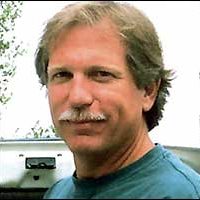Revisiting “Tawdry” Treatment of Reporter who Broke Story on CIA-Contra-Crack-Cocaine Connection
 Gary Webb
Gary Webb
It’s been nearly ten years since reporter Gary Webb shot himself in the head following a torrent of criticism over his series of stories for the San Jose Mercury News about the crack-cocaine epidemic ravaging Los Angeles and the country.
The premise of Webb’s 1996 three-part exposé, “Dark Alliance The Story behind the Crack Explosion,” was that the explosion of crack-cocaine in America’s ghettos was indirectly abetted by the Central Intelligence Agency (CIA). The chief source of drugs for the number one street distributor was a Nicaraguan exile connected to the right-wing, CIA-backed Contras, who were fighting to overthrow that country’s leftist Sandinista-led government.
The June issue of Los Angeles Magazine revisits the story with a first-person account by former Los Angeles Times reporter Jesse Katz, one of 17 reporters pulled together after Webb’s series ran to “analyze” the narrative for the newspaper’s readers. They, and their journalistic brethren across the country, analyzed it and Webb to death.
And now, with the benefit of hindsight and a voluminous 1998 report from the CIA inspector general that outlined the extensive knowledge the agency had about Nicaraguan drug dealing, Katz has a different take on Webb and his work.
“It was a tawdry and defensive exercise, all these august institutions piling on a lone muckraker,” Katz writes in the magazine. “Rather than advance what he got right, we aimed our firepower at his shortcuts, lambasting him for each omission and overstatement.”
Webb, who came under fierce attack by politicians and competing journalists, was abandoned by his editors at the Mercury News and left the paper. No decent publication would hire him and he lost his home before committing suicide. His story is scheduled to be made into a movie, Kill the Messenger, starring Jeremy Renner as Webb. Shooting is supposed to begin this summer.
Katz had written about the crack-cocaine epidemic for the Times two years before Webb’s series, focusing on a key protagonist, Ricky Ross, who “did more than anyone else to democratize it, boosting volume, slashing prices and spreading disease on a scale never before conceived.” But after Ross surprised Katz by getting busted again after two stints in jail, Katz moved to Houston and continued to write for the newspaper from there.
After the Webb series, Katz joined the Times task force and, in the words of LA Weekly reporter Nick Schou, “recast Ross as a much less central player in the crack plague, thus helping dilute the effect of ‘Dark Alliance.’”
Ross went to prison for at least some of his crimes, but was released in September 2009. Katz has not lost interest in the subject whom, he admits, he has always found fascinating. “I was drawn to Rick, to his effervescence and accessibility, to the confounding disconnect between his outlandish deeds and his modest habits.”
Katz’s piece in Los Angeles Magazine is a profile of Ross, who lives in a halfway house and hustles T-shirts on Venice Beach in Los Angeles. It’s a fairly laudatory piece, reflecting Katz’s ongoing attraction for the unique character “who has survived so many incarnations, whose life is such an irresistible puzzle.”
It was that attraction, apparently, that compelled Katz to revisit the Ricky Ross affair and depart from usual journalistic behavior. “We parachute into people’s lives, root around for something that can be distilled and packaged—with accuracy and empathy, at our best—then move on,” Katz writes.
Perhaps they do, unless their work is unfairly ripped to shreds, their reputations ruined and their careers wrecked. Then, sometimes, they kill themselves.
-Ken Broder
To Learn More:
Ex–L.A. Times Writer Apologizes for "Tawdry" Attacks (by Nick Schou, LA Weekly)
Freeway Rick Is Dreaming (by Jesse Katz, Los Angeles Magazine)
The Dark Stain from the Dark Alliance: Cautionary Tales from the Tragic Saga of Gary Webb (by H. “Corky” Johnson, Op-Ed News)
The Contra Story (Central Intelligence Agency)
- Top Stories
- Unusual News
- Where is the Money Going?
- Controversies
- U.S. and the World
- Appointments and Resignations
- Latest News
- What If China Invaded the United States?
- Donald Trump Has a Mental Health Problem and It Has a Name
- Trump Goes on Renaming Frenzy
- Trump Deports JD Vance and His Wife
- Trump Offers to Return Alaska to Russia






Comments